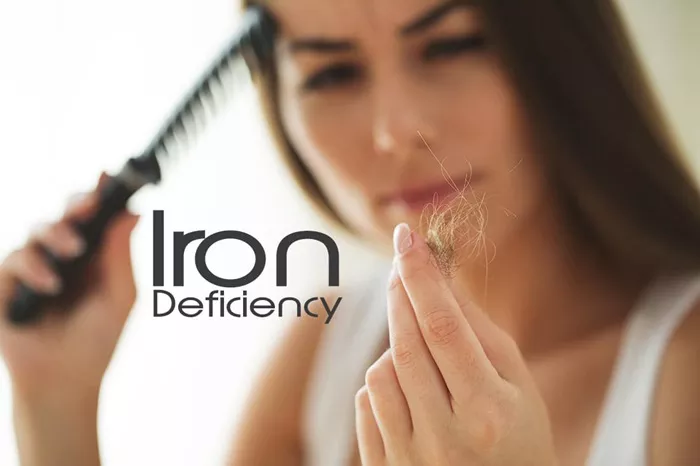Iron deficiency is a common nutritional issue. It affects many people globally. One of its symptoms can be hair loss. Understanding the connection between iron deficiency and hair loss is crucial. This article will explore this link in depth.
Understanding Iron Deficiency
What is Iron Deficiency?
Iron deficiency occurs when the body lacks enough iron. Iron is essential for producing hemoglobin. Hemoglobin is a protein in red blood cells. It carries oxygen to the body’s tissues. Without enough iron, the body can’t make enough healthy red blood cells. This leads to iron deficiency anemia.
Causes of Iron Deficiency
Several factors can cause iron deficiency. These include poor diet, blood loss, and certain medical conditions.
Poor Diet: Consuming insufficient iron-rich foods can lead to iron deficiency. Iron-rich foods include red meat, poultry, fish, lentils, beans, and fortified cereals.
Blood Loss: Significant blood loss can deplete the body’s iron stores. This can happen due to heavy menstrual periods, gastrointestinal bleeding, or injury.
Medical Conditions: Conditions like celiac disease or Crohn’s disease can affect iron absorption. Additionally, certain surgeries can impact iron levels.
Symptoms of Iron Deficiency
Iron deficiency can cause various symptoms. These include fatigue, weakness, pale skin, shortness of breath, dizziness, and headaches. One lesser-known symptom is hair loss.
Link Between Iron Deficiency and Hair Loss
How Iron Deficiency Causes Hair Loss
Iron plays a vital role in various bodily functions. It supports the production of hemoglobin. Hemoglobin carries oxygen to the cells, including hair follicles. Hair follicles need oxygen to grow healthy hair. When the body lacks iron, hair follicles may not receive enough oxygen. This can disrupt the hair growth cycle. As a result, hair may fall out.
Types of Hair Loss Linked to Iron Deficiency
There are different types of hair loss. Iron deficiency can lead to specific types. These include telogen effluvium and diffuse hair loss.
Telogen Effluvium: This is a temporary form of hair loss. It occurs when a large number of hair follicles enter the resting phase. Stress, illness, or nutritional deficiencies can trigger telogen effluvium. Iron deficiency is a common cause. Hair typically sheds more than usual. It can happen after washing or brushing.
Diffuse Hair Loss: This type of hair loss is characterized by thinning hair across the scalp. Iron deficiency can cause diffuse hair loss. The hair becomes less dense and may look sparse.
Research on Iron Deficiency and Hair Loss
Several studies have explored the connection between iron deficiency and hair loss. Research findings suggest a strong link.
A study published in the “Journal of Korean Medical Science” found that women with hair loss had lower iron levels compared to those without hair loss. Another study in the “International Journal of Dermatology” concluded that iron deficiency is common in women with hair loss. It recommended iron supplementation as part of the treatment.
Diagnosing Iron Deficiency
Medical History and Physical Examination
Diagnosing iron deficiency involves a thorough medical history and physical examination. A healthcare provider will ask about symptoms, diet, and medical history. They may also examine the scalp and hair.
Blood Tests
Blood tests are crucial for diagnosing iron deficiency. These tests measure various indicators of iron levels in the blood.
Complete Blood Count (CBC): This test measures the levels of red blood cells and hemoglobin. Low levels can indicate iron deficiency anemia.
Serum Ferritin: Ferritin is a protein that stores iron. Low ferritin levels suggest iron deficiency.
Serum Iron: This test measures the amount of iron in the blood.
Total Iron-Binding Capacity (TIBC): This test measures how well the blood can carry iron. High TIBC levels can indicate iron deficiency.
SEE ALSO: What Are the Diseases That Cause Hair Loss?
Treating Iron Deficiency
Dietary Changes
Improving diet is a key step in treating iron deficiency. Including more iron-rich foods can help.
Heme Iron Sources: Heme iron is found in animal products. It is easily absorbed by the body. Good sources include red meat, poultry, and fish.
Non-Heme Iron Sources: Non-heme iron is found in plant-based foods. It is not absorbed as efficiently as heme iron. Good sources include lentils, beans, spinach, and fortified cereals.
Enhancing Absorption: Certain foods can enhance iron absorption. Vitamin C-rich foods like citrus fruits, tomatoes, and bell peppers help. Avoiding calcium-rich foods and beverages during iron-rich meals can also improve absorption.
Iron Supplements
Iron supplements are often prescribed for iron deficiency. They help replenish iron stores quickly. It’s important to follow the healthcare provider’s instructions. Taking too much iron can cause side effects.
Types of Iron Supplements: There are various types of iron supplements. Ferrous sulfate is commonly prescribed. Other types include ferrous gluconate and ferrous fumarate.
Side Effects: Common side effects of iron supplements include constipation, nausea, and stomach pain. Taking the supplements with food can help reduce these side effects.
Medical Treatment
In severe cases, medical treatment may be necessary. This can include intravenous iron therapy or blood transfusions.
Preventing Hair Loss Due to Iron Deficiency
Regular Check-Ups
Regular check-ups can help detect iron deficiency early. Blood tests can monitor iron levels. Early detection allows for timely intervention.
Balanced Diet
A balanced diet is crucial for preventing iron deficiency. Including a variety of iron-rich foods can help maintain adequate iron levels. Combining heme and non-heme iron sources is beneficial.
Iron Supplements
For individuals at risk of iron deficiency, iron supplements can be preventive. It’s important to consult a healthcare provider before starting supplements.
Conclusion
Iron deficiency is a common condition. It can cause various symptoms, including hair loss. Understanding the link between iron deficiency and hair loss is important. Early diagnosis and treatment can help prevent hair loss. A balanced diet and regular check-ups are key to maintaining healthy iron levels. If you experience hair loss and suspect iron deficiency, consult a healthcare provider. They can provide a proper diagnosis and treatment plan.

